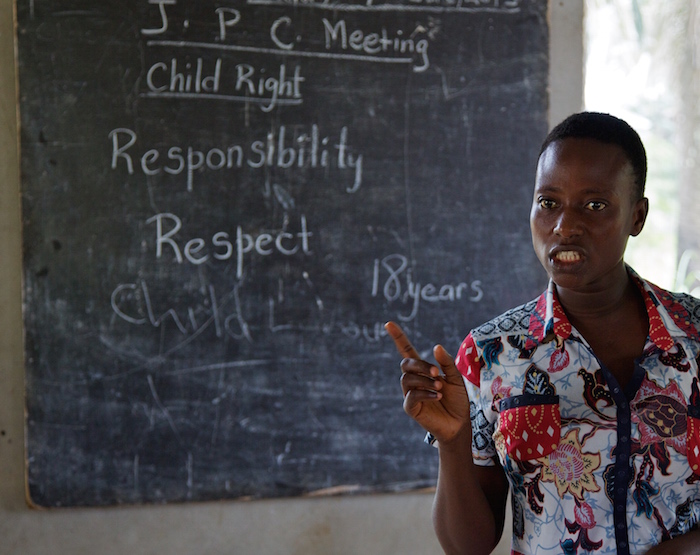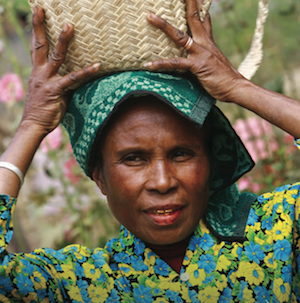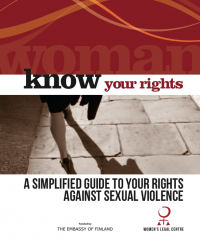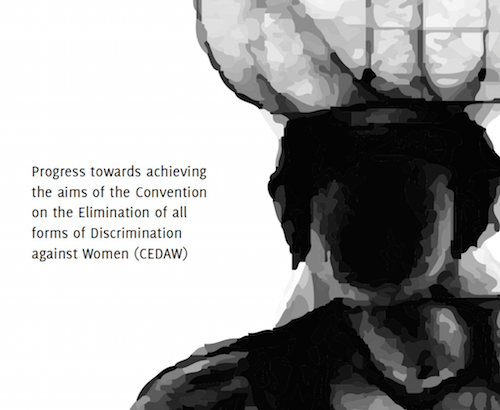Women and girls suffer disproportionately from a lack of legal protection.
Whether the issue be early and forced marriage, property rights and inheritance, or gender-based violence, Namati’s approach doesn’t treat women as victims requiring a service. Instead our model ensures that not only are women able to solve their immediate problems but they are empowered to tackle such problems in the future. This is a cross-cutting theme in all of our grassroots work, from West Africa to the Indian sub-continent.
In Sierra Leone violence against women remains highly prevalent – accurate figures are impossible to establish – and due to the absence of adequate protection from the law, impunity is widespread. In response, through our basic justice services program in Sierra Leone, we have trained community paralegals to deal with the large caseload they see of sexual and gender-based violence (SGBV) and related family disputes – in which 90 per cent of the clients are women. We designed our SGBV training in collaboration with the International Rescue Committee (IRC), who are experts in the field, and the legal and justice department of the Sierra Leone police. With the skills acquired during the training, the paralegals are better equipped not only to deal with the individual victims but are now experienced in working with the police and other law enforcement agencies in assisting victims.
Our community land protection program, which works in Mozambique, Liberia and Uganda, has found that growing land scarcity and increasing competition for land is weakening equitable access to land: fearing loss of land, customary leaders and families shift from flexible, negotiable systems of land holding to more rigid, discriminatory interpretations of land rights. In the process women’s land rights are disregarded or “forgotten” and the land rights of less powerful family members become more tenuous. In some contexts, families are reinterpreting and “rediscovering” customary rules to weaken women’s land rights. In practice, this puts those with weaker land claims — including women, orphans, pastoralists, and other vulnerable groups — at the greatest risk of losing their land.
In Sierra Leone and much of sub-saharan Africa, when a man dies intestate, or without a will, customary laws are often very discriminatory. When the husband dies, the wife gets nothing – indeed in some cases she herself is considered a property to be devolved; one of the brothers of the deceased will inherit the woman- a practice known informally as ‘widow inheritance’. In some traditions, the woman’s consent is not required. In some parts of Sierra Leone, especially in the Northern Provinces, women are not allowed to stand for election to the local chieftaincy nor are they allowed to directly own land.
Throughout the community land protection program, Namati and its partners work to both teach communities about women’s substantive land rights and to ensure women’s involvement in entire land protection process. We do this by ensuring that each community elect one male and one female paralegal and that women are included on the land coordinating committees. We repeatedly urge communities to include the voices and interests of women, youth and strangers in all activities throughout the project and schedule community land documentation meetings in places and at times that women can more easily attend.

Paralegals and the fight against forced and early marriage.
Namati’s Daniel Sesay describes a shocking, but too-common, case of forced marriage in rural Sierra Leone and how paralegals intervened to protect a young woman.
Featured Resources
Accessing Justice: Models, Strategies, and Best Practices on Women's Empowerment
IDLO's study on women's empowerment explores some of the challenges and solutions for women's access to justice in diverse legal systems. Focusing on legal empowerment as a way to improve both access to justice and the quality of justice women receive, this study presents strategies and best practices in both ...
Know Your Rights: A Simplified Guide to Your Rights Against Sexual Violence
This booklet, by the Women's Legal Centre of South Africa, was put together in an effort to provide women better information of their rights regarding sexual violence. After realizing that many women do not report acts of sexual violence because they are unaware that they have the right to not ...
Rural Women’s Access to Land and Property in Selected Countries: Progress Towards Achieving the Aims of the Convention on the Elimination of All Forms of Discrimination against Women
This is a 2010 report on progress toward the Convention on the Elimination of All Forms of Discrimination against Women (CEDAW), with respect to the status of rural women. The information is summarized in three tables: a list of States Parties' initial and periodic reports, rural women within CEDAW Committee's Concluding ...




